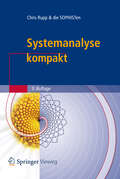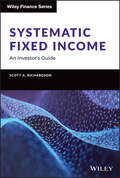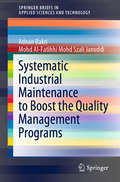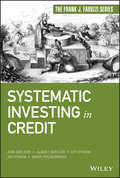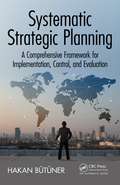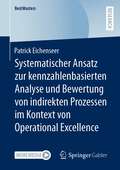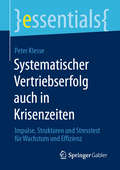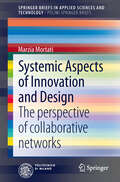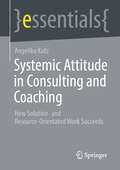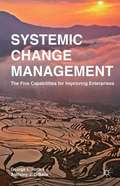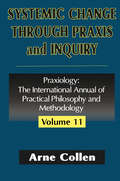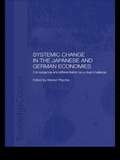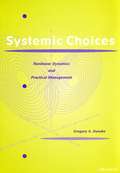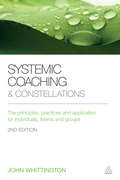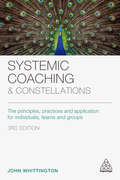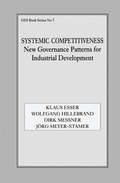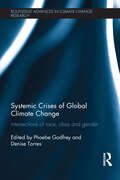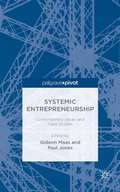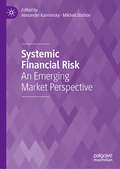- Table View
- List View
Systemanalyse kompakt
by Chris Rupp Sophist GmbhSystemanalyse kompakt zeigt Ihnen die Schwerpunkte der Anforderungsanalyse im Rahmen der Software- und Systemanalyse auf. Die Anforderungsanalyse bildet das Fundament eines jeden Systementwicklungsprojektes und entscheidet daher maßgeblich über Erfolg oder Misserfolg Ihres Projektes. Gerade in der Analysephase eröffnet sich Ihnen das Potenzial zur effizienten und zielorientierten Beeinflussung der Systementwicklung: Erstellen Sie eine vollständige und eindeutige Anforderungsdefinition, bei der Aufwand und Ergebnis in optimalem Verhältnis zueinander stehen. Dabei hilft Ihnen Systemanalyse kompakt. Das Buch bringt die Haupttätigkeiten der Systemanalyse auf den Punkt. Dabei vermittelt es mit den vom International Requirements Engineering Board festgelegten Begriffen, Definitionen und Zusammenhängen neben grundlegenden organisatorischen Rahmenbedingungen zahlreiche pragmatische Ansätze, wie Sie das grundlegend notwendige Wissen - umfassend ermitteln, - verständlich dokumentieren, - effektiv verwalten - und angemessen prüfen. Lösungsvorschläge zu konkreten Problemen der Systementwicklung und praxiserprobte Tipps unterstützen Sie bei Ihrer täglichen Arbeit. So können Sie dafür sorgen, dass die Anforderungen an ein System von allen Projektbeteiligten verstanden und verwirklicht werden können.
Systematic Fixed Income: An Investor's Guide (Wiley Finance)
by Scott A. RichardsonUnderstand the role and potential of fixed income as an asset class Systematic Fixed Income: An Investor’s Guide offers readers a powerful, practical, and robust framework for investors and asset managers to preserve the diversifying properties of a fixed income allocation, and add to that unique sources of excess returns via systematic security selection. In other words, this framework allows for efficient capture of fixed income beta and fixed income alpha. Celebrated finance professional Dr. Scott Richardson presents concrete strategies for identifying the relevant sources of risk and return in public fixed income markets and explains the tactical and strategic roles played by fixed income in typical portfolios. In the book, readers will explore: The implementation challenges associated with a systematic fixed income portfolio, including liquidity and risk The systematic return sources for rate and credit sensitive fixed income assets in both developed and emerging marketsAn essential read for asset managers and institutional investors with a professional interest in fixed income markets, Systematic Fixed Income: An Investor’s Guide deserves a place in the libraries of advanced degree students of finance, business, and investment, as well as other investment professionals seeking to refine their understanding of the full potential of this foundational asset class.
Systematic Industrial Maintenance to Boost the Quality Management Programs (SpringerBriefs in Applied Sciences and Technology)
by Adnan Bakri Mohd Al-Fatihhi Mohd Szali JanuddiThis book discusses the main quality management (QM) programs and their possible integration into systematic industrial maintenance (SIM). Unlike traditional engineering maintenance books, it not only explains the theory but also provides practical examples of the integration of QM and SIM programs. It also includes reference sources, making it useful for readers wanting to explore specific areas in more depth.Chapter 1 introduces various aspects of the main quality management (QM) programs, including total quality management (TQM), just-in-time (JIT) and lean manufacturing (Lean). Subsequently, it examines the relation of quality and maintenance. Chapter 2 reviews the concepts of systematic industrial maintenance (SIM) and the application of quality control (QC) tools. Chapter 3 offers an overview, historical perspective and trends in industrial maintenance techniques. Chapters 4, 5, 6, 7, 8 and 9 focus on topics related to schedule-based maintenance, condition-based maintenance, reliability-based maintenance, computerized-based maintenance, risk-based maintenance and total productive maintenance. Covering the theory of each of these types of SIM, the chapters also explain their real-world application in QM and highlight their merits and weaknesses in the context of supporting QM.
Systematic Investing in Credit (Frank J. Fabozzi Series)
by Arik Ben Dor Lev Dynkin Jay Hyman Albert Desclee Simon PolbennikovPraise for SYSTEMATIC INVESTING in CREDIT "Lev and QPS continue to shed light on the most important questions facing credit investors. This book focuses on their latest cutting-edge research into the appropriate role of credit as an asset class, the dynamics of credit benchmarks, and potential ways to benefit from equity information to construct effective credit portfolios. It is must-read material for all serious credit investors."—Richard Donick, President and Chief Risk Officer, DCI, LLC, USA "Lev Dynkin and his team continue to spoil us; this book is yet another example of intuitive, insightful, and pertinent research, which builds on the team's previous research. As such, the relationship with this team is one of the best lifetime learning experiences I have had."—Eduard van Gelderen, Chief Investment Officer, Public Sector Pension Investment Board, Canada "The rise of a systematic approach in credit is a logical extension of the market's evolution and long overdue. Barclays QPS team does a great job of presenting its latest research in a practical manner."—David Horowitz, Chief Executive Officer and Chief Investment Officer, Agilon Capital, USA "Systematization reduces human biases and wasteful reinventing of past solutions. It improves the chances of investing success. This book, by a team of experts, shows you the way. You will gain insights into the advanced methodologies of combining fundamental and market data. I recommend this book for all credit investors."—Lim Chow Kiat, Chief Executive Officer, GIC Asset Management, Singapore "For nearly two decades, QPS conducted extensive and sound research to help investors meet industry challenges. The proprietary research in this volume gives a global overview of cutting-edge developments in alpha generation for credit investors, from signal extraction and ESG considerations to portfolio implementation. The book blazes a trail for enhanced risk adjusted returns by exploring the cross-asset relation between stocks and bonds and adding relevant information for credit portfolio construction. Our core belief at Ostrum AM, is that a robust quantamental approach, yields superior investment outcomes. Indeed, this book is a valuable read for the savvy investor."—Ibrahima Kobar, CFA, Global Chief Investment Officer, Ostrum AM, France "This book offers a highly engaging account of the current work by the Barclays QPS Group. It is a fascinating mix of original ideas, rigorous analytical techniques, and fundamental insights informed by a long history of frontline work in this area. This is a must-read from the long-time leaders in the field."—Professor Leonid Kogan, Nippon Telephone and Telegraph Professor of Management and Finance, MIT "This book provides corporate bond portfolio managers with an abundance of relevant, comprehensive, data-driven research for the implementation of superior investment performance strategies."—Professor Stanley J. Kon, Editor, Journal of Fixed income "This book is a treasure trove for both pension investors and trustees seeking to improve performance through credit. It provides a wealth of empirical evidence to guide long-term allocation to credit, optimize portfolio construction and harvest returns from systematic credit factors. By extending their research to ESG ratings, the authors also provide timely insights in the expanding field of sustainable finance."—Eloy Lindeijer, former Chief of Investment Management, PGGM, Netherlands "Over more than a decade, Lev Dynkin and his QPS team has provided me and APG with numerous innovative insights in credit markets. Their work gave us valuable quantitative substantiation of some of our investment beliefs. This book covers new and under-researched areas of our market
Systematic Strategic Planning: A Comprehensive Framework for Implementation, Control, and Evaluation
by Hakan ButunerThis book provides a complete set of practical strategic planning techniques and tools. Readers are guided in identifying how and in what circumstances they might use particular tools, and in targeting them directly at achieving effective results. Systematic Strategic Planning consists of a framework of phases through which each project passes, a pattern of procedures for straight-forward planning and the fundamentals involved in any strategic planning project. The book is designed to be simple to understand and easy to use.
Systematische Entwicklung von Dienstleistungsinnovationen: Augmented Reality für Pflege und industrielle Wartung (Informationsmanagement und digitale Transformation)
by Helmut Krcmar Isabell M. Welpe Manuel Wiesche Hartmut RemmersDieser Sammelband zum Projekt „Augmented Reality in flexiblen Dienstleistungsprozessen" (ARinFLEX) zeigt Anwendungsfälle für Dienstleistungsinnovationen in Pflege und industrieller Wartung auf. Die Autoren entwickeln Ideen, Konzepte und Prototypen für innovative Dienstleistungen mittels Augmented Reality und evaluieren diese in verschiedenen Kontexten. Der Sammelband bietet Grundlagen, Kontext und methodische Unterstützung zur Digitalisierung von Dienstleistungen in Pflege und industrieller Wartung.
Systematischer Ansatz zur kennzahlenbasierten Analyse und Bewertung von indirekten Prozessen im Kontext von Operational Excellence (BestMasters)
by Patrick EichenseerEine möglichst optimale und effiziente Ausgestaltung von indirekten Prozessen gewinnt aufgrund von Fachkräftemangel, steigender Gemeinkosten, sich verändernder Kostenstrukturen und einem generellen Verbesserungsbedarf in der Administration zunehmend an Bedeutung. In diesem Buch wird daher ein systematischer Ansatz zur kennzahlenbasierten Analyse und Bewertung von indirekten Prozessen im Kontext von Operational Excellence beschrieben. Die zentrale Basis bilden hierbei fünf relative und eine absolute Kennzahl, die die Prozessgüte im Hinblick auf Effizienz, Produktivität, Kosten, Qualität und die Kundensicht operationalisieren. Die Erhebung aller für die Berechnung notwendigen Daten und Bewertungsmaßstäbe erfolgt mit vordefinierten Methoden, welche in Form eines Methodenkoffers bereitgestellt werden. Mithilfe des sogenannten Process Excellence Index und dem Process Excellence Radar kann eine abschließende Visualisierung sowie ein Benchmarking der Bewertungsergebnisse erfolgen. Die Darstellung aller analysierten und bewerteten Prozesse in einem indirekten Prozessportfolio ermöglicht obendrein die unternehmensspezifische Klassifizierung und Priorisierung von Prozessoptimierungsprojekten. Die zusammenfassende Handlungsempfehlung kann schlussendlich dafür genutzt werden, um den neuen Analyse- und Bewertungsansatz praktikabel im Unternehmenskontext anzuwenden.
Systematischer Vertriebserfolg auch in Krisenzeiten: Impulse, Strukturen und Stresstest für Wachstum und Effizienz (essentials)
by Peter KlesseVertriebsorganisationen sind oft auf schönes Wetter ausgerichtet. Wird das Unternehmensumfeld rauer, muss sich der Vertrieb darauf einstellen und wetterfest werden. Peter Klesse diskutiert die Arten von Krisen und zeigt, was Sie tun müssen, um mit dem Vertrieb Ihr Unternehmen durch die Krise zu führen. Was für den Erfolg in der Krise benötigt wird, hilft auch, den Vertrieb im Normalbetrieb besser zu machen. Der Autor schlägt den Bogen von möglichen Krisenursachen über die strategische Absicherung, Maßnahmen für Effizienzsteigerung, Mehrumsatz und zur Cash-Sicherung bis hin zu einem schnellen 7-stufigen Stresstest Vertrieb. Ausführungen zur Rolle des Marketing und Hinweise zur Prioritätensetzung für eine erfolgreiche Umsetzung runden dieses essential ab.Der Autor: Peter Klesse ist Geschäftsführer einer Vertriebsberatung mit langjähriger Beratungs- und Vertriebserfahrung. Er unterstützt Unternehmen vieler Branchen als Berater und Interimmanager im Vertrieb, meist mit Fokus auf dem Industriegeschäft. Er hat selbst Krisenprojekte erfolgreich geleitet und begleitet. Zudem ist Peter Klesse Hochschul-Lehrbeauftragter für Vertriebsmanagement.
Systemic Aspects of Innovation and Design
by Marzia MortatiThe book provides a snapshot of a hot topic - the systemic nature of innovation and its relevance to design - with a trifold perspective: the academic level - the literature on innovation studies and design is often neglected and a clear connection between the two topics taken for granted; the research level - collaborative models are currently considered great opportunities for transforming consumption, production and distribution of goods, but a clear scholarly discourse is still forming; the political level - the European Commission and the OECD are devoting much effort to understanding and measuring the impact of design in innovation processes and firms and a clear contribution would greatly support this path. Thus the book provides an informed, historical and nuanced perspective to the relationship between design and innovation to contribute to all three levels and to propose a point of view that goes beyond aesthetics and meanings.
Systemic Attitude in Consulting and Coaching: How Solution- and Resource-orientated Work Succeeds (essentials)
by Angelika KutzIn this Springer essentials it is shown that the action portfolio of systemics offers a wonderful basis to support clients - or a client system - in the best possible way to initiate and shape change processes (change) and to work out suitable solutions for the client system. The systemic attitude can also be learned, is a healing companion in all life situations and represents a continuous maturing process.
Systemic Bank Restructuring and Macroeconomic Policy
by William E. Alexander Liam P. Ebrill Jeffrey M. Davis Carl-Johan LindgrenSystemic Bank Restructuring and Macroeconomic Policy. Includes bibliographical references.
Systemic Banking Crises: A New Database
by Fabian Valencia Luc LaevenA report from the International Monetary Fund.
Systemic Change Management
by George L. Roth Anthony J. DibellaAchieving and sustaining great business performance requires more than ongoing internal improvements; it demands a capacity to promote changes across organizations that depend on one another. Through a series of cases, Systemic Change Management describes a systems approach to enterprise change. Organizations are more successful individually and collectively when they develop and diffuse five enterprise change capabilities - promoting enterprise awareness, installing innovation sets, balancing push and pull changes, seeking growth, and distributing leadership. Each capability enhances individual firm performance and when used together create a synergy that magnifies their overall effectiveness and impact. This book explains how a system of change capabilities can be developed and demonstrates their use at a variety of organizations, including United Technologies, Rockwell Collins, Raytheon, Toyota, Ariens, the US Army, and US Air Force. The reader will come to understand that performance improvement requires internal change along with collaboration with suppliers and other organizations to effectively function as an enterprise.
Systemic Change Through Praxis and Inquiry
by Arne CollenThis new volume in the distinguished Praxiology series examines the confluence of praxiology, pragmatics, and systemics in the study of systemic change through human inquiry, particularly small group activities, human organizations, and globalizing trends. It covers core concepts indigenous to organizational life. The author presents and subsequently integrates several conceptual schemes relevant to human beings and small groups engaged in human inquiry for systemic change in organizational settings.Each key concept in the volume is covered in a chapter theme that articulates the praxiology and pragmatics of human inquiry. Chapter 1 examines change as a systemic idea from a research methodologist's point of view. Chapter 2 articulates numerous points to distinguish systemic from non-systemic research methods to bring about systemic change. Chapter 3 discusses the prevalence of hierarchy and control. Chapter 4 focuses on "disciplinarity," viewed as one kind of quest for understanding complexity and change. Chapter 5 describes praxiology in inquiry. Chapter 6 elaborates on emergent forms of praxiology. Chapter 7 demonstrates the viability of systemic change through praxiology. Chapter 8 targets the general features of research process that are the means to effectuate systemic change, while Chapter 9 elaborates on these means toward developing systemic inquiry to systemic change. Chapter 10 discusses "complexification" in human inquiry and systemic change.Systemic Change Through Praxis and Inquiry is a pioneering effort to attain a more integrated view of research methodology for human inquiry. It will be of great interest to students of business, management, and organizational studies.Arne Collen is a long-standing member of both the Executive Faculty at Saybrook Graduate School in San Francisco and the Research and Teaching Adjunct Faculty in the California College of Organizational Studies and the California College of Professional Psychology of Alliant International University, San Francisco Bay Campus. He is a research methodologist, who, over the last three decades, has applied systemic and sociocybernetic perspectives to advances in research methodology for human inquiry. With Wojciech W. Gasparski, he is co-editor of Design and Systems, Volume 3 of the Praxiology series.
Systemic Changes in the German and Japanese Economies: Convergence and Differentiation as a Dual Challenge
by Werner PaschaShould Japan and Germany strive to restructure their institutional fabric and arrangements to make them more similar to Anglo-American standards? Where will systemic change lead? This book offers fresh insights by collecting Japanese and German contributions to this scholarly discussion both from theoretical and empirical viewpoints. A major conclusion of several papers is that the forces of differentiation are frequently underestimated. Important thematic issues include: contingency, path dependence and complementarity. Examinations of economic globalisation and rapidity of technological change pose questions about the nature of socio-economic system analysis in the future.
Systemic Choices
by Gregory A. DanekeThe revolution in social scientific theory and practice known as nonlinear dynamics, chaos, or complexity, derived from recent advances in the physical, biological, and cognitive sciences, is now culminating with the widespread use of tools and concepts such as praxis, fuzzy logic, artificial intelligence, and parallel processing. By tracing a number of conceptual threads from mathematics, economics, cybernetics, and various other applied systems theoretics, this book offers a historical framework for how these ideas are transforming the social sciences. Daneke goes on to address a variety of persistent philosophical issues surrounding this paradigm shift, ranging from the nature of human rationality to free will. Finally, he describes this shift as a path for revitalizing the social sciences just when they will be most needed to address the human condition in the new millennium. Systemic Choicesdescribes how praxis and other complex systems tools can be applied to a number of pressing policy and management problems. For example, simulations can be used to grow a number of robust hybrid industrial and/or technological strategies between cooperation and competition. Likewise, elements of international agreements could be tested for sustainability under adaptively evolving institutional designs. Other concrete applications include strategic management, total quality management, and operational analyses. This exploration of a wide range of technical tools and concepts will interest economists, political scientists, sociologists, psychologists, and those in the management disciplines such as strategy, organizational behavior, finance, and operations. Gregory A. Daneke is Professor of Technology Management, Arizona State University, and of Human and Organization Development, The Fielding Institute.
Systemic Circular Economy Solutions for Fiber Reinforced Composites (Digital Innovations in Architecture, Engineering and Construction)
by Marcello Colledani Stefano TurriThis open access book provides an overview of the work undertaken within the FiberEUse project, which developed solutions enhancing the profitability of composite recycling and reuse in value-added products, with a cross-sectorial approach. Glass and carbon fiber reinforced polymers, or composites, are increasingly used as structural materials in many manufacturing sectors like transport, constructions and energy due to their better lightweight and corrosion resistance compared to metals. However, composite recycling is still a challenge since no significant added value in the recycling and reprocessing of composites is demonstrated. FiberEUse developed innovative solutions and business models towards sustainable Circular Economy solutions for post-use composite-made products. Three strategies are presented, namely mechanical recycling of short fibers, thermal recycling of long fibers and modular car parts design for sustainable disassembly and remanufacturing. The validation of the FiberEUse approach within eight industrial demonstrators shows the potentials towards new Circular Economy value-chains for composite materials.
Systemic Coaching and Constellations
by John WhittingtonSystemic Coaching and Constellations offers a refreshingly uncomplicated path into a potentially complex subject, demonstrating how this approach can provide access to systems and deliver enduring benefits for coaching clients. This new edition offers a comprehensive introduction to the principles that sustain systems, real world descriptions of what systemic coaching is and how it can be useful as well as a step-by-step guide to integrating the principles and practices into coaching. Highly practical, Systemic Coaching and Constellations includes a wide range of exercises for application with individuals and teams. It also includes a brand new chapter on Belonging, fully updated case studies from coaches who have taken part in John's trainings, a joint ICF/EMCC constellation workshop and examples from coaches around the world, including Australia, Mexico, France, Spain, US and the Netherlands. Whether used in an initial selection meeting or to underpin all your coaching conversations and interventions, Systemic Coaching and Constellations offers an accessible, practical starting point to transform your coaching practice.
Systemic Coaching and Constellations: The Principles, Practices and Application for Individuals, Teams and Groups
by John WhittingtonSystemic Coaching and Constellations offers a refreshingly uncomplicated path into a potentially complex subject, demonstrating how to understand and manage intricate relationship systems as part of a powerful coaching agenda. It provides a comprehensive introduction to the principles that sustain systems, how to map and explore them through constellations, as well as a step-by-step guide to integrating these principles and practices into coaching. Featuring a variety of case studies from around the world to illustrate different facilitation styles and approaches, it also contains practical exercises which can be used in a variety of contexts, including one-to-one coaching, group coaching, leadership development coaching and managing conflict in teams.This updated third edition of Systemic Coaching and Constellations contains a new chapter on systemic supervision, new material on team coaching, systemic questions and resourcing constellations as well as new and refreshed case studies and updates to wider research and thinking. Whether used in an initial selection meeting or to underpin all coaching conversations and interventions, it remains an indispensable resource for coaches of all levels of experience and in all remits looking to transform their practice, as well as for those studying coaching as part of a degree or coaching qualification.
Systemic Competitiveness: New Governance Patterns for Industrial Development
by Dirk Messner Jörg Meyer-Stamer Klaus Esser Wolfgang HillebrandThe authors emphasize that an economy's competitiveness relies on purposive and intermeshed measures at the meta-, macro-, meso-, and micro- level and a multidimensional guidance concept consisting of competition, dialogue and shared decision-making which integrates the key groups of actors.
Systemic Crises of Global Climate Change: Intersections of race, class and gender (Routledge Advances in Climate Change Research)
by Phoebe Godfrey Denise TorresSociological literature tends to view the social categories of race, class and gender as distinct and has avoided discussing how multiple intersections inform and contribute to experiences of injustice and inequity. This limited focus is clearly inadequate. Systemic Crises of Global Climate Change is an edited volume of 49 international, interdisciplinary contributions addressing global climate change (GCC) by intentionally engaging with the issues of race, gender, and class through an intersectional lens. The volume challenges and inspires readers to foster new theoretical and practical linkages and think beyond the traditional, and oftentimes reductionist, environmental science frame by examining issues within their turbulent political, cultural, and personal landscapes. Varied media and writing styles invite students and educators to reflexively engage different, yet complementary, approaches to GCC analysis and interpretation, mirroring the disparate voices and viewpoints within the field. The second volume, Emergent Possibilities for Sustainability will take a similar approach but will examine the possibilities for solutions, as in the quest for global sustainability. This book is a valuable resource for academics, researchers and both undergraduate and post-graduate students in the areas of Environmental Studies, Climate Change, Gender Studies and International studies as well as those seeking a more intersectional analysis of GCC.
Systemic Cycle and Institutional Change: Labor Markets in the USA, Germany and China
by Josip LučevThis book explores endogenous institutional change and the global, cyclical, and power-based drivers that underpin it. A metatheoretical framework is presented to highlight the influence of path dependence, systemic cycle driven power relations, and institutional design on the development of labor institutions. The framework is applied to the USA, Germany, and China to provide a comparative economic perspective. Systemic Cycle and Institutional Change: Labor Markets in the USA, Germany and China aims to examine endogenous institutional change through analyzing the systemic cycle and bringing together global and national conceptions of capitalism. It is relevant to students and researchers interested in comparative economics, political economy, and labor economics.
Systemic Entrepreneurship: Contemporary Issues and Case Studies
by Paul Jones Gideon MaasSystemic Entrepreneurship focuses on creating an awareness of systemic entrepreneurship and illustrates the fact that one needs to approach entrepreneurial support activities from many different angles.
Systemic Financial Crises
by Luc Laeven Patrick HonohanThis book was first published in 2005. Faced with a systemic financial sector crisis, policymakers need to make difficult choices under pressure. Based on the experience of many countries in recent years, few have been able to achieve a speedy, lasting and low-cost resolution. This volume considers the strengths and weaknesses of the various policy options, covering both microeconomic (including recapitalization of banks, bank closures, subsidies for distressed borrowers, capital adequacy rules and corporate governance and bankruptcy law requirements) and macroeconomic (including monetary and fiscal policy) dimensions. The contributors explore the important but little understood trade-offs that are involved, such as between policies which take effect quickly, those which minimize long-term fiscal and economic costs, and those which create favorable incentives for future stability. Successfully implementing crisis management and crisis resolution policy required attention to detail and a good flow of information.
Systemic Financial Risk: An Emerging Market Perspective
by Alexander Karminsky Mikhail StolbovThis book provides an analysis of various sources and forms of systemic financial risk. It focuses on the most pressing research questions for both advanced and emerging market economies, including green finance, ESG agenda and related risks, international financial connectivity across countries and financial institutions, and catastrophic risks modeling. Part 1 considers emerging research issues in risk assessment and management, including new approaches to measuring financial development, trends and prospects of green finance, and cross-country financial spillovers. Part 2 casts a more nuanced look at the quantitative models and methods adopted in risk assessment and risk management, putting such issues as measuring catastrophic risks, liquidity mismatches as well as modeling probabilities of default and the impact of macroeconomic fundamentals on capital adequacy ratios in the Russian banking sector in the spotlight. Finally, Part 3 discusses the new regulatory challenges dealingwith risk assessment and risk management, such as macroprudential policies which have proved efficient to mitigate systemic risk are investigated. The book offers a comprehensive picture of the challenges which emerging market economies are facing in the field of financial risk assessment and management. Specifically, the challenges are discussed in the context of elaborated models and policy responses, which are based on the up-to-date theoretical contributions and empirical evidence from various fields, making the book relevant to professors, researchers, graduate students, and practitioners of risk management, international finance, and financial services.
